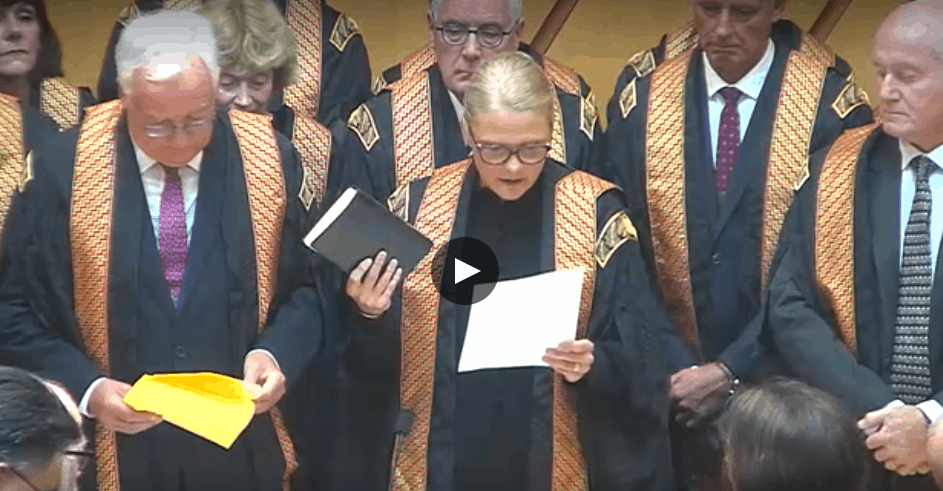Dame Helen Winkelmann has taken her seat as New Zealand’s top Judge, noting in the legal star-studded swearing in ceremony that access to justice issues were some of the most important that confronted the legal profession.
Addressing the court, she said the Supreme Court has woven the history of New Zealand into important judgments concerning the status of the Treaty of Waitangi.

“It has provided access to justice. A far greater number of cases have been decided in this court, particularly in the criminal justice jurisdiction, than was ever possible when our final court resided in Downing Street, London,” she said.
“The Supreme Court was the fulfilment of a vision that important legal matters … should be resolved in New Zealand conditions, history and traditions. New Zealanders should no longer have to travel across oceans to argue cases before judges, some of whom had never touches the soil of our land or seen it.”

>> Raynor Asher Continues Trend To Return to the Bar
The effective administration of justice depends on effective human interaction, she said.
“Not all but many of the interactions need to be on a face-to-face basis. The presence of courthouses in which lawyers can meet with their clients and in which judges can see and talk to defendants in person is a holding thread in our system of justice. Courthouses represent the presence of law in towns throughout New Zealand.
“The people who work in courts are leaders of their community. They are a source of knowledge in how the system works … sometimes they are the only source of knowledge about the law.”
One of the speakers before Dame Helen delivered her address was Auckland City Missioner Chris Farrelly. Dame Helen noted that it was a small departure from convention to have a person who is not a lawyer speak at such a ceremonial event.
“But Mr Farrelly was invited to speak so that voices not usually heard in our courts are represented on this day. A day in which we think and speak of our hopes and expectations for the administration of justice. He reminded us to think of those who are marginalised, who are marginalised because they can’t engage with the social and economic frameworks of our society for whatever reason – and it’s most often poverty, sometimes disability, ethnicity, or, as he identified, the experience of trauma in their lives.
Obstacles to access to justice
There are significant and troubling obstacles to the achievement of access to justice, Dame Helen said. Without knowledge of the law, many don’t know they have a problem with which the law can help them.
“The cost of legal representation is so great that it is only the well-to-do who can afford a lawyer to represent them in the court. And that really is a substantial challenge for the profession. There are few lawyers practising civil legal aid and fewer still in areas of need and the reasons for that problem are complex.
“For those who decide to go it alone and attempt to represent themselves, there is still a considerable cost barrier of court fees and the difficulty of court procedure.
“The solution to many of these problems lies beyond the control of the judiciary but … the judiciary cannot shy away from them. As Chief Justice I can use occasions such as this to highlight the issues and where I can be of assistance, I will support the work of the profession and the community in removing the barriers that stand in the way of those who would seek the shelter of the law.”
The Power Law Listees
The swearing-in ceremony was attended by a who’s who of the legal profession and judiciary. Those in attendance included the Governor-General, Dame Patsy Reddy, the Heads of Bench (with Deputy Chief Māori Land Court Judge Caren Fox in the absence of Chief Māori Land Court Judge Wilson Isaac), Justice Minister Andrew Little, Attorney-General David Parker, the Chief Justices of New South Wales and Victoria, and most of New Zealand’s senior courts judiciary. Retiring Chief Justice Dame Sian Elias was also present.
Access to justice was a strong theme of all the speeches made. Attorney-General David Parker noted that the appointment of Dame Helen and her predecessor Dame Sian – the first two women to be appointed Chief Justice – was “an indication that the ledger is balancing towards equality”.
Ethel Benjamin Remembered
Law Society president Kathryn Beck pointed to the 2014 Ethel Benjamin address which Dame Helen delivered and in which she called for a greater commitment to access to justice for all.
“Our country’s strong standing and international rankings have diverted us from an uncomfortable truth. That in our country, we have increasingly large numbers of our citizens who are powerless when it comes to a core fundamental right – access to justice. We have a growing mass of people who are excluded from the system that is in place to protect us. The judiciary and the legal profession cannot shy away from the challenges we are currently facing to access to justice in New Zealand.”
New Zealand Bar Association President Kate Davenport QC said pressure on the courts was a problem the new Chief Justice would have to grapple with.
“The most pressing question is how can all New Zealanders get a fair deal? A right to be heard is of no use if you cannot afford to exercise it.
“The challenge for the executive and the profession is to ensure that all those cases who are legitimate and who with within the criteria set out within the relevant legislation can turn to our courts from the lowest to the highest for determination of their case without facing debilitating barriers.”
Watch the swearing in ceremony here:
